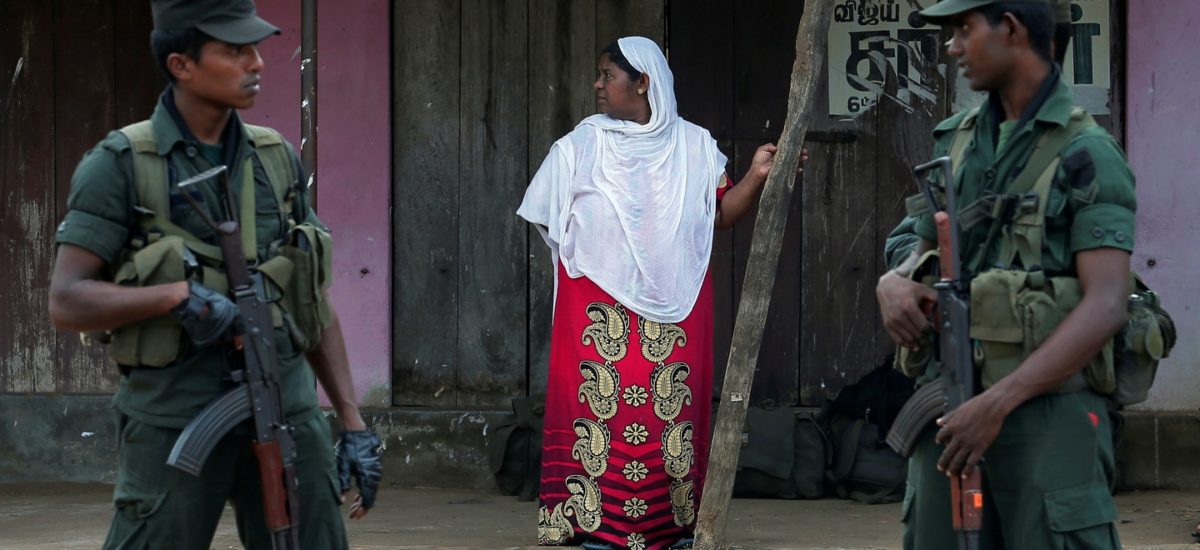Image Courtesy The Irish Times
Over decades, regardless of the government in power the abuses enabled by the Prevention of Terrorism Act (PTA) never ceased. They only decreased or increased depending on the regime in power. Even during Yahapalana arbitrary arrests and torture of persons detained under the PTA did take place, albeit at a reduced level.
The entrenched nature of the abuse of persons arrested under the PTA is illustrated by the near identical pattern of abuse over decades. For instance, those arrested in relation to the Easter attacks in 2019 suffered abuses similar to those arrested for LTTE related offences two decades ago. This demonstrates two critical factors. Primarily, the law itself is abusive and does not adhere to basic human rights standards. Secondly, since the abusive practices have been normalized and are deeply entrenched, violating due process is not the exception but the norm.
An example of this is the letter dated 23 October 2021 issued by the Inspector General of Police, which sets out the investigation and arrest procedure to be followed when making arrests under the PTA. The letter does not consist of special instructions but of basic due process safeguards which should be respected when making any arrest, not only arrests under the PTA. The fact the IGP had to remind the police of basic proper arrest procedure shows that the failure to follow proper procedure during arrest is the norm, not the exception.
How not to “reform” the PTA
Nearly all human rights deficient provisions in the PTA remain untouched. Most of the supposedly new remedies provided, such as filing a fundamental rights petition challenging detention and informing the Human Rights Commission of Sri Lanka (HRCSL) of the arrest, already exist and are not new.
The most egregious provision in the PTA is the section that allows confessions made to an Assistant Superintendent of Police (ASP) and above to be admitted as evidence. This provision has enabled the torture of persons to extract confessions, a fact well documented by the Supreme Court as well as the HRCSL. According to the HRCSL’s national study of prisons, 83% of persons detained under the PTA reported being subjected to torture, of which 90% were forced to sign a confession. An example of the injustice this provision enables is the tragic case of Selvachandran Chandrabose who was arrested when he was 27 years old and indicted on the basis of a confession obtained through torture. He spent 13 years in prison and was acquitted in December 2019, but died in 2021 less than two years after being released.
A new section that requires magistrates to visit places of detention at least once a month has been introduced. Prima facie this appears positive. The reality however is different. The provision states that if the magistrate thinks the person may have been subject to torture the magistrate “may” refer the person to a Judicial Medical officer (JMO). Hence, it is not mandatory for the magistrate to refer a person suspected of being tortured to the JMO. If the JMO finds the person has been tortured, the magistrate has to order medical treatment for the person. However, the section does not make it mandatory for the Magistrate to refer the allegation of torture to the IGP for investigation. Hence, the Magistrate has the discretion whether or not to make such a referral. Nor does the proposed amendment require the tortured person to be transferred to another place of detention or provide safeguards to ensure the person will not be tortured again. In this context, persons may not complain about torture for fear of reprisals.
Whether a minimum once a month visit by the magistrate is adequate to prevent torture has to be viewed in the context of many factors, including the inadequacy of existing systemic checks. This inadequacy was highlighted in the May 2021 Supreme Court judgment in the custodial death of 17 year old Sandun Malinga, which explicitly identified the JMO as an entity that had failed to fulfill its duty.
Fact is, it is quite easy to hide tortured persons from visiting HRCSL or ICRC. I have had many such experiences during my visits to the Boossa detention centre and prisons when I was a Commissioner of the HRCSL. Not only persons detained under the PTA, but also persons detained under other laws, were hidden from us because they had been tortured prior to our visit and had visible marks of torture. In most instances, the tortured persons were located only due to continued visits to the same place of detention on consecutive days and thorough searches of the premises.
Furthermore, the government’s stated intent to prevent torture appears disingenuous when it has taken no action to repeal two other provisions which facilitate torture. They are sections 7(3), which allows the police to take the person out of prison to another place for interrogation even after the person has been remanded, and section 15A, which allows the Secretary Defence to decide on a place of detention after the person has been remanded to judicial custody, even following conviction. The worst forms of torture have been recorded to have taken place when these two provisions were used. Another deficiency of Section 15A is that it allows the executive to remove the person from judicial custody, including after the person has been convicted, and in effect override a judicial order.
Bail: give with one hand and take away with the other
In general law bail is the norm and not the exception. In the PTA however bail is the exception, not the norm.
At present, the PTA allows the Magistrate to grant bail with the consent of the Attorney-General if the person has not been indicted. The Court of Appeal can grant bail in exceptional circumstances after a person is convicted and is on appeal. When a person has been indicted, Section 15(2) makes it mandatory to remand the person until the conclusion of the trial. Additionally, the PTA constraints the judiciary’s power to grant bail by making it dependent on the Attorney-General’s (AG) consent. In practice, the AG’s consent is difficult to obtain and persons languish in remand for years. Fifteen years is the longest period the HRCSL has recorded of a person being held in remand without being indicted.
In practice, the granting of bail under the PTA has been inconsistent. For instance, Sivanesathurai Santhirakanthan, i.e. Pillayan, was indicted in 2017 and was granted bail by the Batticaloa High Court in November 2020 while the trial was on-going. Contrast this with the denial of bail by the Puttalam High Court to Hejaaz Hisbullah even after the AG consented to bail.
A new provision on bail has been included in the proposed amendments. It states that if the trial against a person has not commenced 12 months after the arrest of the person who has been detained or remanded, the Court of Appeal can release the person on bail. The section further states, that if the trial has not begun 12 months after the indictment has been filed, the High Court may consider bail. Both parts of this new section state that bail may be granted if the trial has not begun. However, only the second part mentions the indictment. Since the first part of the section makes no mention of an indictment, one assumes the first part refers to granting bail prior to indictment.
The critical factors to note are that while the current law allows the Magistrate Court to grant bail if the indictment has not been filed, the proposed amendment appears to empower the Court of Appeal to grant bail in such instances. Secondly, the granting of bail is dependent on the indictment not being filed or the trial not beginning after the indictment has been filed. If, the trial has begun, the proposed amendment still allows the High Court to remand the person until the conclusion of the trial. Therefore, in practice, the proposed amendment is unlikely to change the status quo.
Smoke and mirrors and empty promises
The global counter-terrorism architecture has aided governments all over the world to be “politically savvy” and appropriate international human rights language. Hence, governments, including our own, point to international counter terror laws to justify the enactment of counter-terror legislation that restricts human rights. To counter this smoke and mirrors approach and demand the government fulfil its duty to protect human rights, we must look to international human rights laws and standards, such as those set out in the letter issued by seven UN Special Procedures mandate holders in Dec 2021.
Any counter terror law should include a precise definition of terrorism and access to a judicial hearing on the legality of the detention within no longer than 48 hours of being detained. All forms of administrative detention outside the criminal justice process, i.e. detention on detention orders issued by the Minister of Defence, should be abolished per the recommendation of the UN Committee Against Torture. The right of access to legal counsel should include the presence of a lawyer during all interrogations to ensure the right to a fair trial is respected at a time when their vulnerability might be exploited to unlawfully obtain a confession or to interpret any silence as an indication of guilt. Confessions made to police officers should not be admissible as evidence and bail should not be the exception.
These basic human rights protections are non-negotiable. These basic human rights protections are absent in the proposed amendment.


